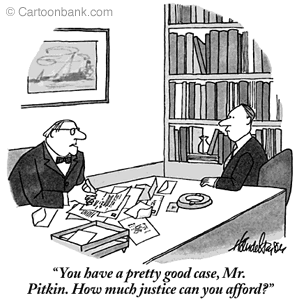Open Letter to the King of Torts.
 Throwing out old papers, I ran across a letter from the King of Torts, Joe Jamail. Jamail, who made a name for himself when he won the largest verdict in history, 11 billion dollars in the case of Texaco v. Pennzoil, had sent me (and several thousand of my Texas colleagues) a letter about the election of judges. Jamail asked us to join his efforts to change the rules governing the election of judges in Texas. He wanted a system in which judges would be appointed rather than elected. To me, that spelled corruption. But I was wrong.
Throwing out old papers, I ran across a letter from the King of Torts, Joe Jamail. Jamail, who made a name for himself when he won the largest verdict in history, 11 billion dollars in the case of Texaco v. Pennzoil, had sent me (and several thousand of my Texas colleagues) a letter about the election of judges. Jamail asked us to join his efforts to change the rules governing the election of judges in Texas. He wanted a system in which judges would be appointed rather than elected. To me, that spelled corruption. But I was wrong.A greater corruption is bred by the election of judges. Sure, the people have a voice. But the nature of politics corrupts the system.
1) Judges end up asking themselves how their rulings might affect their reelection.
2) Judges have to choose a party. In Texas many are now affectionately called "RINOS," or Republicans In Name Only, because they obviously switched parties only to keep their jobs.
3) Having to be reelected means having to raise money for a campaign--lots and lots of money. And where does that money come from? Law firms, of course. I'm involved in a number of lawsuits filed in an East Texas County, and it's never good for the defendants. In fact, defense attorneys usually walk out of hearings shaking their heads, marveling at inexplicable rulings. It often seems the judge is not even listening to the defense position. And everyone gathered at the elevator wonders aloud whether it might actually be true--could Judge M______ actually be "bought and paid for" by the rich plaintiffs' firm that funds his reelection? (And that's not to say defense firms don't donate as well and for the same reasons.) Once litigants offered judges bribes. Today their attorneys handle all that with campaign funds. Is bribe too strong a word? Call it quid pro quo--you scratch my back, I'll look out for you in all your cases next year.
The election of judges breeds corruption. Joe Jamail was right.

0 Comments:
Post a Comment
<< Home